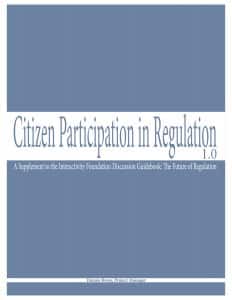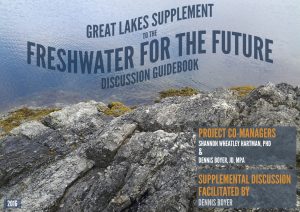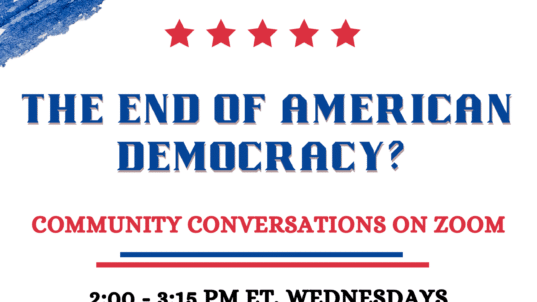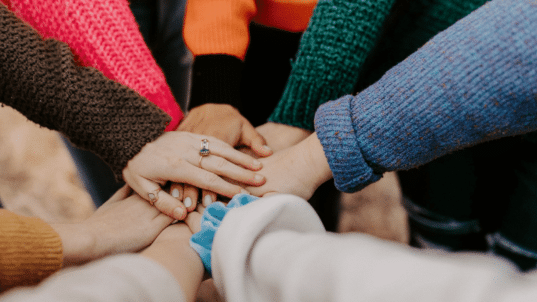 Many of my IF colleagues and affiliated facilitators have had the experience of lively discussions of Interactivity Foundation guidebooks that conclude with discussants asking “what’s next?”. These expressions of confusion, frustration, and agitation vary from person to person and may be due, in large part, to the uncommon experience of discussion at the conceptual level that IF materials expect. We see our role as encouraging broader thinking about policy matters, not only of the topics in particular guidebooks, but of how to examine the entire notion of exploring ideas and developing possible approaches.
Many of my IF colleagues and affiliated facilitators have had the experience of lively discussions of Interactivity Foundation guidebooks that conclude with discussants asking “what’s next?”. These expressions of confusion, frustration, and agitation vary from person to person and may be due, in large part, to the uncommon experience of discussion at the conceptual level that IF materials expect. We see our role as encouraging broader thinking about policy matters, not only of the topics in particular guidebooks, but of how to examine the entire notion of exploring ideas and developing possible approaches.
Yet for some participants that very process seems to help clarify their thinking on certain policy areas in ways that activate them and deepen a desire to take a next step. We have never seen it as part of our mission to determine for others what those next steps might be, but we have had successful experiences in lending our process and materials as starting points for public conversations that have led to concrete actions at the community and institutional levels.
In the course of an update of the guidebook The Future of Regulation, I found my panel of “developmental advisors” expressing strong feelings that the large topic of regulation would benefit from narrower framing around some sub-topics. Two such sub-topics were the matters of financial sector regulation and citizen engagement in the regulatory sphere. I convened additional developmental panels in these two areas and found that they rather handily came up with the raw material of approaches that could be used as starting points for more specific public conversation or policy consideration. (https://issuu.com/swhartman/docs/citizen_participation_in_regulation/1)
 At roughly the same time as these regulation revision discussions I was co-managing with Shannon Wheatley Hartman the Freshwater for the Future project.
At roughly the same time as these regulation revision discussions I was co-managing with Shannon Wheatley Hartman the Freshwater for the Future project.
The Wisconsin panel of that project developed an early and firm sentiment that whatever core guidebook resulted from the project, we should also prepare “supplements” geared to the water conditions of particular regions or watersheds. They foresaw a sequence in which the primary guidebook would be used as a starting point to “raise consciousness” about the topic and then delve into somewhat narrower considerations that arise in local situations that might lead to development of “supplements” to the main guidebook. In addition, a number of Freshwater panelists served with me on the Waters of Wisconsin Initiative of the Wisconsin Academy of Sciences, Arts, and Letters (WASAL) in a year-long effort to update their working papers and communications approach to water topics.
After the conclusion of that project and the publication of the Freshwater for the Future guidebook (https://issuu.com/swhartman/docs/freshwater_web_version/1), we had an opportunity to participate in an effort that lent itself to a water conversation about the Great Lakes region. It was decided to start with the IF Freshwater guidebook as a foundation, further explore the WASAL papers from the Waters of Wisconsin Initiative (www.wisconsinacademy.org/initiative/wow), and attempt to develop some further materials that might be useful in regional discussions.
This effort succeeded beyond my modest expectations. The individuals involved not only brought diverse perspectives on water issues, but had working knowledge of how policy develops (or doesn’t) and some experience in community-level civic education. They started with the IF Freshwater policy that focused on ethical foundations for water governance (Policy “B”) and then moved into exploration of policies that centered on deeper cooperation and coordination (Policy “C”), empowering local water governance (Policy “D”), and providing for fair distribution of water (Policy “E”). WASAL’s materials were then reviewed with an eye toward providing a more local framing suitable for areas of relative water abundance. The group decided to devote special attention to an issue that they thought was of particular regional interest: polluting nutrients in water. They also developed a fictional water policy setting aimed at exploration of real world difficulties of developing policy (“Lake Webegoing” case study). The result was, in effect, a mini-guidebook around Great Lakes approaches to water policy. (https://www.interactivityfoundation.org/wp-content/uploads/2016/04/IF-Freshwater-Great-Lakes-Supplement.pdf)
Some comments on this experience are in order. First, this was not the typical citizen discussion group—it functioned more on the level of what IF would consider an expert or specialist panel. Second, the resulting product is not definitive—it is simply one set of approaches that might aid subsequent discussions by those inclined to believe that development of a water ethic is a pre-condition for sound water policy and find themselves in environments that resemble the upper Great Lakes region of Huron, Michigan, and Superior and nearby watersheds. Finally, it may not always be possible to find institutional partners and citizen participants who are willing and able to work through a deliberative process that involves this many steps—political timetables may preclude it and leaders may have already narrowed options in their own minds.
The above caveats aside, I see reason for optimism that we can bridge the gap between conceptual discussion of IF materials and more developed implementations placed in local context. We need not compromise the IF desire to avoid policy prescriptions and to encourage wider consideration of policy possibilities. Indeed, our willingness to encourage the use of our guidebooks in this fashion may provide many more potential opportunities for discussion partnerships with groups that want to “ground” their policy development in open-ended starting points before moving on to specifics. And, when carefully applied, such a discussion sequence provides some answers to the participant questions of “what’s next?”.
Dennis Boyer is an IF Fellow based in Southwest Wisconsin.



